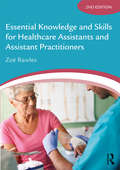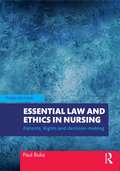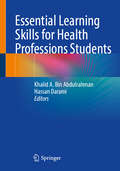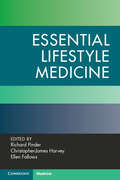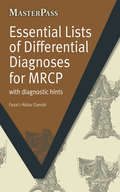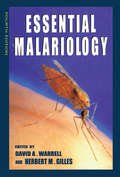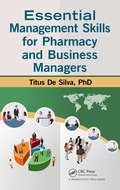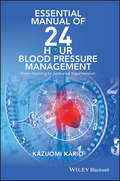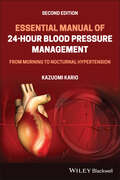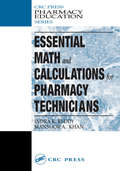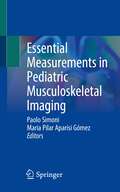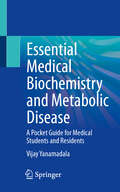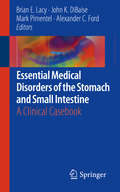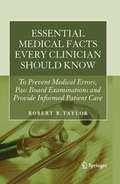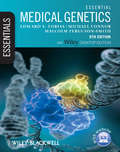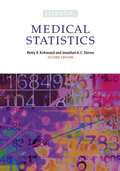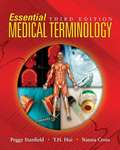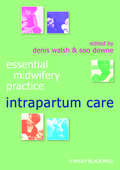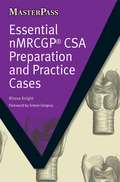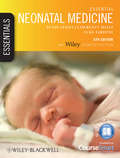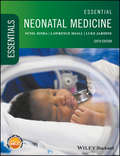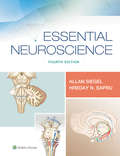- Table View
- List View
Essential Knowledge and Skills for Healthcare Assistants and Assistant Practitioners
by Zoë RawlesThis fully updated and revised edition of Essential Knowledge and Skills for Healthcare Assistants and Assistant Practitioners is a practical and comprehensive text designed to equip you with the necessary clinical skills for your profession. This book: • equips you with the knowledge to provide the safest and most effective patient care possible; • provides evidence-based guidelines to ensure best practice that is matched to the National Occupational Standards and the Care Certificate; • includes new chapters on administering injections, ear irrigation and examining the feet of people with diabetes, and an entirely rewritten chapter on protocols; • addresses the evolving role of the healthcare assistant and training opportunities; • supplies comprehensive coverage of both primary and secondary care settings, with an emphasis on primary care; • covers accountability, communication skills, confidentiality and reflection; and • uses a light-hearted and accessible style, with definitions, case studies and activities to aid understanding. This is an indispensable guide for all those training as healthcare assistants and assistant practitioners, and an introductory textbook for students embarking on nursing and health and social care programmes.
Essential Law and Ethics In Nursing: Patients, Rights and Decision-Making
by Paul BukaThis thoroughly updated third edition lays a solid foundation for understanding the intersection of law, ethics and the rights of the patient in the context of everyday nursing and health care practice. Outlining the key legal and ethical principles relevant to nurses, Essential Law and Ethics In Nursing: Patients, Rights and Decision-Making, previously entitled Patients’ Rights: Law and Ethics for Nurses, uses an easy-to-read style that conveys key principles in an accessible way. It: provides a clear understanding not only of basic legal provisions in health care but also of wider issues relating to human rights; covers topics such as ethical decision-making, the regulation of nursing, confidentiality, laws concerning human rights, safe practice, vulnerable people, elder abuse and employment regulations; and includes thinking points, case studies and relevant case law to help link theory with practice. This is essential reading for nurses and an important reference for midwives and allied health professionals.
Essential Learning Skills for Health Professions Students
by Khalid A. Bin Abdulrahman Hassan DaramiThis book covers the learning and teaching objectives for the teachers and students of the health profession. It covers not only the conceptual framework of learning, teaching, and studying but also addresses students' needs, including effective communication, study habits, and stress management. The chapters integrate the basics of a course with its clinical science. From active learning strategies to problem-based learning techniques, the book covers effective methods for engagement and self-directed learning. Additionally, it addresses essential skills such as time management, critical thinking, and information retrieval. Supplemented with easy-to-read text, illustrations, and summary boxes explaining educational messages, the book aims to ease learning. The book is relevant for both students and professionals in medicine and health sciences, helping them understand the basics of teaching and learning for health professions students.
Essential Lifestyle Medicine
by Richard J. Pinder Christopher-James Harvey Ellen FallowsThis indispensable text presents an overview of the essential knowledge, understanding and skills in Lifestyle Medicine, including a thorough explanation of the '6 Pillars' concept. There is no shortage of clinicians interested in the subject, but knowing where to start has, until now, been a challenge. Based around the innovative 'Bridge' diagram of Lifestyle Medicine, the textbook provides a clinically oriented perspective for undergraduate and postgraduate learners interested in evidence-based, person-centred care. Packed with practical guidance on preventing, managing and treating lifestyle-related long-term conditions, sample scripts and assessments to trigger conversations and engagement with patients are included. With contributions from around the world, this guide is a fantastic resource to start developing the essential clinical skills necessary for the practice of Lifestyle Medicine.
Essential Lists of Differential Diagnoses for MRCP: with Diagnostic Hints (MasterPass)
by Fazal-I-Akbar DanishDifferential diagnosis texts for the MRCP can overload candidates with detailed information, making revision seem difficult and overwhelming. In contrast, this book avoids exhaustive lists of often rare causes and concentrates instead on a maximum of five of the most common causes in terms of prevalence for each scenario, making revision more structured and manageable. The book includes diagnostic hints - clinical or lab clues that point towards a specific diagnosis - and a unique chapter on key ECG causes and features. Although primarily intended for MRCP Part I & II and FCPS (Pakistan) Part II candidates, this book will also be useful for undergraduate students preparing for finals.
Essential Malariology, 4Ed (An\arnold Publication Ser.)
by David A. Warrell Herbert M GillesEssential Malariology, Fourth Edition is a concise and practical handbook that covers all aspects of malaria from a clinical perspective - its control, prevention and treatment. This edition has been thoroughly updated and contains brand new chapters on malaria in children, malaria in pregnancy, and vaccines. Incorporated throughout are the latest research into, and understanding of, molecular biology, and the latest diagnostic techniques. In addition, new colour plates and figures are included to complement the text.
Essential Management Skills for Pharmacy and Business Managers
by Titus De SilvaAs a manager you will be expected to resolve a range of legal, ethical, operational, human resource, and financial issues that affect your organization. Essential Management Skills for Pharmacy and Business Managers supplies the understanding you will need to manage the day-to-day challenges in this increasingly competitive environment. Presenting a wealth of information on how to resolve common issues across all sectors of the pharmacy environment, it uses case studies to illustrate the methods required to create a patient-focused business where teamwork flourishes and continuous improvement becomes a reality.The book describes the kinds of things that will most often go wrong in organizations of all types and sizes and provides proven methods for resolving these issues. It explains how to develop and implement an effective quality management system in the pharmacy or a retail operation that complies with external standards. Outlining an efficient performance appraisal system, it describes how to manage diversity and details time-tested problem solving, conflict management, and stress management techniques.With coverage that includes employee management, quality management, and quality assurance, the book describes how to create a harmonious work environment that promotes effective communication between pharmacy staff, medical professionals, care givers, patients, and customers. Complete with links to further information in each chapter, it arms you with the tools to empower and motivate your employees to provide world-class patient and customer care.
Essential Manual of 24 Hour Blood Pressure Management: From morning to nocturnal hypertension
by Kazuomi KarioIt is well known that cardiovascular events occur more frequently in the morning as blood pressure (BP) levels have been shown to increase during the period from night to early morning. In recent years, clinical research using ambulatory blood pressure monitoring (ABPM) or home BP monitoring has clarified that morning BP and BP surge are more closely related to the cardiovascular risk than clinical BP. This practical manual from field leading expert, Dr. Kazuomi Kario, reviews recent evidence on "morning" and "nocturnal" hypertension and the IT technologies physicians can use to support patients in home monitoring BP. Guidance on management via antihypertensive drugs is also discussed and with the aim of promoting "perfect 24 hour BP control".
Essential Manual of 24-Hour Blood Pressure Management: From Morning to Nocturnal Hypertension
by Kazuomi KarioESSENTIAL MANUAL OF 24-HOUR BLOOD PRESSURE MANAGEMENT Hypertension is one of the greatest threats to human health. The World Health Organization (WHO) estimates that 1.13 billion people worldwide have hypertension. In 2017, new guidelines for managing hypertension were published by the American Hypertension Association (AHA), guidelines which lowered the diagnosis thresholds of hypertension, and thereby increased the prevalence of hypertension. As such, hypertension is now recognized as a more serious and widespread a condition than ever before. In this new edition of the Essential Manual of 24-Hour Blood Pressure Management, the author emphasizes that lowering the blood pressure (BP) and restoring the BP profile with adequate circadian rhythm is essential for a long life without cardiovascular events. The author also introduces updated evidence for managing hypertension throughout 24-hour periods, from morning to nocturnal hypertension. The Essential Manual of 24-Hour Blood Pressure Management, Second Edition, will be an essential companion for doctors who wish to provide evidence-based medicine and be familiar with the most cutting edge technology on monitoring BP. Medical researchers and students will also value the author’s many insights, drawn from his distinguished career.
Essential Math and Calculations for Pharmacy Technicians (Pharmacy Education Series)
by Mansoor A. Khan Indra K. ReddyAccurately calculating medication dosages is a critical element in pharmaceutical care that directly affects optimal patient outcomes. Unfortunately, medication dosage errors happen in pharmacies, in hospitals, or even at home or in homecare settings everyday. In extreme cases, even minor dosage errors can have dire consequences. Careful calculations are essential to providing optimal medical and pharmaceutical care. Essential Math and Calculations for Pharmacy Technicians fills the need for a basic reference that students and professionals can use to help them understand and perform accurate calculations. Organized in a natural progression from the basic to the complex, the book includes:Roman and Arabic NumeralsFractions and decimalsRatios, proportions, and percentagesSystems of measurement including household conversionsInterpretation of medication ordersIsotonicity, pH, buffers, and reconstitutionsIntravenous flow ratesInsulin and Heparin productsPediatric dosageBusiness mathPacked with numerous solved examples and practice problems, the book presents the math in a step-by-step style that allows readers to quickly grasp concepts. The authors explain the fundamentals simply and clearly and include ample practice problems that help readers become proficient. The focus on critical thinking, real-life problem scenarios, and the self-test format make Essential Math and Calculations for Pharmacy Technicians an indispensable learning tool.
Essential Mathematics and Statistics for Forensic Science
by Craig AdamThis text is an accessible, student-friendly introduction to the wide range of mathematical and statistical tools needed by the forensic scientist in the analysis, interpretation and presentation of experimental measurements.From a basis of high school mathematics, the book develops essential quantitative analysis techniques within the context of a broad range of forensic applications. This clearly structured text focuses on developing core mathematical skills together with an understanding of the calculations associated with the analysis of experimental work, including an emphasis on the use of graphs and the evaluation of uncertainties. Through a broad study of probability and statistics, the reader is led ultimately to the use of Bayesian approaches to the evaluation of evidence within the court. In every section, forensic applications such as ballistics trajectories, post-mortem cooling, aspects of forensic pharmacokinetics, the matching of glass evidence, the formation of bloodstains and the interpretation of DNA profiles are discussed and examples of calculations are worked through. In every chapter there are numerous self-assessment problems to aid student learning.Its broad scope and forensically focused coverage make this book an essential text for students embarking on any degree course in forensic science or forensic analysis, as well as an invaluable reference for post-graduate students and forensic professionals.Key features:Offers a unique mix of mathematics and statistics topics, specifically tailored to a forensic science undergraduate degree.All topics illustrated with examples from the forensic science discipline.Written in an accessible, student-friendly way to engage interest and enhance learning and confidence.Assumes only a basic high-school level prior mathematical knowledge.
Essential Measurements in Pediatric Musculoskeletal Imaging
by Paolo Simoni Maria Pilar Aparisi GómezThis practical guide presents an up-to-date, comprehensive yet concise collection of the most frequently used measurements in musculoskeletal studies carried out in children and adolescents through the different radiological modalities.The book covers the measurements applied on various anatomical regions in a succinct and easy-to-use structure, with additional chapters dedicated to specific techniques and focused evaluations. It provides radiological images, informative drawings, and diagrams to describe each measurement and explain its applications and role in specific diseases. Also, the book identifies potential difficulties regarding positioning and techniques and offers tips to avoid misinterpretation.The book is a handy reference for everyday use and helps practitioners evaluate pediatric musculoskeletal studies by providing precise instructions on how to perform accurate measurements and interpret them to obtain an accurate diagnosis.
Essential Medical Biochemistry and Metabolic Disease: A Pocket Guide for Medical Students and Residents
by Vijay YanamadalaThis practical, pocket-sized guide presents everything that a medical student needs to know to master the biochemistry and human metabolism content for the USMLE Step 1. It is a clear concise review of these topics in an easy to understand and digestible format. Each of the five sections provides high-yield information on the essentials of carbohydrate, lipid, protein, nucleotide and vitamin metabolism, respectively, including diagrammatic figures and tables for at-a-glance referral.
Essential Medical Disorders of the Stomach and Small Intestine: A Clinical Casebook
by Mark Pimentel Alexander C. Ford Brian E. Lacy John K. DiBaiseThis casebook provides a concise yet comprehensive state-of-the art review of common stomach and small intestine disorders. The casebook is divided into five parts, each of which focuses on a major disorder, symptom, or clinical scenario related to the stomach and small intestine, including dyspepsia, small bowel disorders, nausea and vomiting, chronic abdominal pain, and post-operative GI surgery challenges. Each part is comprised of cases illustrating different aspects of the subject, with each case containing sections on case presentation, objectives, epidemiology and etiology, diagnostic evaluation and treatment, case follow-up, clinical pearls, and Q&A. Some major topics presented in these cases include nausea and vomiting in the pregnant patient, gas-bloat, functional abdominal pain, post-GI surgery complications, and celiac disease and non-celiac gluten sensitivity. Written by internationally renowned experts in the field, Essential Medical Disorders of the Stomach and Small Intestine: A Clinical Casebook is a valuable resource for clinicians and practitioners who treat patients afflicted with disorders of the stomach and small intestine.
Essential Medical Facts Every Clinician Should Know
by Robert B. TaylorEssential Medical Facts presents selected literature-based information clinicians need to know to provide informed patient care and avoid medical misadventures. Facts that can help make us better and safer clinicians include knowing the usefulness of palmar crease pallor in detecting anemia (not reliable), antibiotics that can cause a false positive opiate urine drug screen (fluoroquinolones), and an occasional early clue to testicular cancer (gynecomastia). Of course, keeping up to date on current medical knowledge and being curious about the implications of published research conclusions not only help assure superior clinical performance; they also bolster the preparation for board examinations. Robert B. Taylor, MD is the author and editor of more than two dozen medical books and several hundred published articles, as well a veteran of both rural private practice and chairmanship of a medical school clinical department. Essential Medical Facts is written for clinicians in all specialties, at all stages of professional life. It is a "must have" book for students, residents and practicing physicians, as well as nurse practitioners and physician assistants actively involved in clinical diagnosis and management of disease.
Essential Medical Genetics (Essentials #22)
by Edward S. Tobias Michael Connor Malcolm Ferguson-SmithAdopted at Cambridge University Essential Medical Genetics provides students, clinicians, counsellors and scientists with the up-to-date information they need regarding the basic principles underlying medical genetics. It also provides guidance on how to apply current knowledge in clinical contexts, covering a wide variety of topics: from genome structure and function to mutations, screening and risk assessment for inherited disorders. This sixth edition has been substantially updated to include, for instance, the latest information on the Human Genome Project as well as several new molecular genetic and chromosome analysis techniques. In full colour throughout, it includes a number of brand new features, including: a large number of self-assessment questions; 'Essentials' chapter summaries; further reading suggestions; and case study scenarios introducing clinical situations. An invaluable new section gives illustrated practical advice regarding how to choose the best available online genetic databases and also, importantly, how to most easily and most efficiently use them, for a wide range of purposes. Essential Medical Genetics is the perfect resource for a course on medical genetics, and is now accompanied by a regularly updated website and the FREE enhanced Wiley Desktop Edition (upon purchase of the book). The companion website at www.wiley.com/go/tobias features figures from the book in PowerPoint format and a link to the authors' website with regularly updated links to genetic databases and additional self-test questions. This title is also available as a mobile App from MedHand Mobile Libraries. Buy it now from iTunes, Google Play or the MedHand Store.
Essential Medical Statistics
by Betty R. Kirkwood Jonathan A. C. SterneBlackwell Publishing is delighted to announce that this book has been Highly Commended in the 2004 BMA Medical Book Competition. Here is the judges' summary of this book: "This is a technical book on a technical subject but presented in a delightful way. There are many books on statistics for doctors but there are few that are excellent and this is certainly one of them. Statistics is not an easy subject to teach or write about. The authors have succeeded in producing a book that is as good as it can get. For the keen student who does not want a book for mathematicians, this is an excellent first book on medical statistics." Essential Medical Statistics is a classic amongst medical statisticians. An introductory textbook, it presents statistics with a clarity and logic that demystifies the subject, while providing a comprehensive coverage of advanced as well as basic methods. The second edition of Essential Medical Statistics has been comprehensively revised and updated to include modern statistical methods and modern approaches to statistical analysis, while retaining the approachable and non-mathematical style of the first edition. The book now includes full coverage of the most commonly used regression models, multiple linear regression, logistic regression, Poisson regression and Cox regression, as well as a chapter on general issues in regression modelling. In addition, new chapters introduce more advanced topics such as meta-analysis, likelihood, bootstrapping and robust standard errors, and analysis of clustered data. Aimed at students of medical statistics, medical researchers, public health practitioners and practising clinicians using statistics in their daily work, the book is designed as both a teaching and a reference text. The format of the book is clear with highlighted formulae and worked examples, so that all concepts are presented in a simple, practical and easy-to-understand way. The second edition enhances the emphasis on choice of appropriate methods with new chapters on strategies for analysis and measures of association and impact. Essential Medical Statistics is supported by a web site at www.blackwellpublishing.com/essentialmedstats. This useful online resource provides statistical datasets to download, as well as sample chapters and future updates.
Essential Medical Terminology (3rd edition)
by Peggy Stanfield Nanna CrossThis best-selling introduction to medical terminology text is flexible enough to be used in a traditional or a self-instructional course format. Suited for students of all levels in the allied health professions, this text provides the appropriate amount of detail needed to learn the basics of medical terminology. After studying the fundamentals of pronunciation, students can study the chapters in any order the instructor deems appropriate The Third Edition also includes a new chapter on Cancer Medicine and a user-friendly CD-ROM with interactive flashcards, crossword puzzles, and additional exercises. This text with helpful online resources is highly accessible for all health care students, offering a wealth of valuable information at an attractive price. Read the Preface And The Guidelines on How to Use This Book! Do you want to provide your Medical Terminology students with an easy-to-use online learning experience? Our new JBCourseManager is a free online resource when you adopt! JBCourseManager for Essential Medical Terminology, Third Edition features: Pre-loaded instructor resources as well as the function to upload your own Medical search term function Medical term of the day Ability to add your own assignments, quizzes, wikis, workshops, blogs, etc. , and change or remove the pre-loaded content Links to medical term pronounciation Accessible calendar with "upcoming events" reminders Threaded discussion forums, live chat sessions, and instant messaging capabilities Unique discussion forum setting, known as our "Q&A", cuts down on students copying answers Comprehensive reports to view all student activity Complete Companion Website with a vast array of resources including audio files
Essential Midwifery Practice
by Denis Walsh Soo DowneIntrapartum care has undergone profound changes over the past fifty years. Essential Midwifery Practice: Intrapartum Care takes a broad sweep to examine these changes and their intersection with midwifery, in particular their impact on the midwife's role during labour and birth. It is an invaluable guide for all midwives.Essential Midwifery Practice: Intrapartum Care addresses a wide range of topics including the evolution of intrapartum care, debates about knowledge, and childbirth education. It looks at birth environments, labour rhythms, working with pain, normal birth, unusual labours, and complementary therapies. Written by key experts and providing guidance on best practice, this unique and diverse text will bring readers up-to-date with the latest research and reflection in their specialist fields.Written by key experts in their respective fields coming together for the first timeProvides comprehensive examination of normal birth practiceEvidence-based, bringing you up-to-date with the latest research
Essential NMRCGP CSA Preparation and Practice Cases (MasterPass)
by Rhona KnightThe Clinical Skills Assessment (CSA) of the new Membership of the Royal College of General Practice (nMRCGP) examinations can be a daunting test: candidates face assessment on an unknown situation by a 'patient' and assessor, however, help is at hand. This book has been written by a CSA examiner in concert with GP training programme members to help candidates approach the exam feeling prepared, calm and in control. It includes advice on preparation, consultation skills, how the assessment is marked, and 12 practice CSA cases, along with advice on how candidates can create cases with which to practise and assess each other. Clear, practical, and based on sound knowledge and proven techniques, this book will be essential reading for nMRCGP CSA candidates. 'Rhona is a passionate and compassionate educator with a strong sense of natural justice, and also a long-standing MRCGP examiner. She has developed an approach to understanding and preparing for the Clinical Skills Assessment (CSA) that is already tried, tested and proven. An approach that will enhance the candidate's ability as a GP at the same time as preparing them for the CSA.' - Simon Gregory in his Foreword
Essential Neonatal Medicine
by Luke Jardine Lawrence Miall Sunil SinhaEssential Neonatal Medicine combines the depth and breadth of a textbook with the clarity and efficiency of a learning consolidator. Providing a solid reference for trainee doctors, neonatal nurses and midwives, this full colour edition has been extensively updated with a range of new illustrations, clinical tips, cross-references to Wiley title Nursing the Neonate (2010, 9781405149747), and end-of-chapter summaries for quick study or revision.Essential Neonatal Medicine is ideal for all trainee health professionals experiencing neonatology for the first time and looking for a readable and comprehensive resource to support them. It is now accompanied by the enhanced Wiley Desktop Edition (the interactive digital version of the book featuring downloadable text and images, highlighting and note-taking facilities, book-marking, cross-referencing, in-text searching, and linking to references and glossary terms), and a companion website at www.essentialneonatalmed.com featuring figures from the book to download in PowerPoint, further reading, and self-test questions for each chapter.
Essential Neonatal Medicine
by Luke Jardine Lawrence Miall Sunil SinhaProviding a comprehensive yet concise guide for trainee doctors, neonatal nurses and midwives, Essential Neonatal Medicine continues to be an indispensable resource that combines the depth and breadth of a textbook with the efficiency of a revision guide. Extensively updated and full-colour throughout, this edition includes new chapters on neonatal transport and palliative care, as well as further content on pathophysiology and embryology, quality improvement and risk management, infection control, and non-invasive ventilation. With an improved artwork programme and a new glossary of terms, Essential Neonatal Medicine is ideal for all trainee health professionals new to neonatology, or looking for a comprehensive aid to support them.
Essential Neuropharmacology: The Prescriber's Guide
by Stephen D. Silberstein Stephen M. Stahl Nancy Muntner Michael J. Marmura"Essential Neuropharmacology: The Prescriber's Guide expertly reviews the most important medications used by neurologists in their practice. Experienced clinicians share their expert knowledge about the best use of medications in patient care. Each drug listing contains the range of indications, their advantages and disadvantages, and tips for dosing and avoiding adverse effects. Experts in fields such as multiple sclerosis, movement disorders, neuromuscular disorders, epilepsy, stroke, pain and headache summarize how neurologists use these medications to their best effect, and discuss off-label uses in neurology. Evidence is taken from recent clinical trials, which helps the reader relate the content to everyday clinical practice. The detailed descriptions of each medication enable the user to make quick and informed decisions with the confidence they need to best serve the clinical needs of their patients. This book is an essential, user-friendly reference suitable for all neurologists at all stages of their careers"--Provided by publisher.
Essential Neuropsychology: A Concise Handbook for Adult Practitioners
by Jonathan DeRightThe goal of this book is to provide brief-but-comprehensive information that can aid in rapid differential diagnosis and allow for more thorough follow-up if needed. This guide is intended to fit easily into the pocket of a lab coat or on your desk, giving readers an efficient way to find information about a specific disease or disorder to prepare for an upcoming case. The book is divided into two parts: Part 1 involves general psychometric and reference information including score classifications, formulas for score conversion, likelihood chaining, and reliable change, psychometric data for stand-alone and embedded PVTs, and the effects of common medications on cognition. Part 2 of the book is organized alphabetically by disease or disorder to promote quick searching, and each chapter provides straightforward information including definitions, subtypes, etiology, epidemiology, course, diagnostic criteria, expectations for test results, and links to more comprehensive sources. Whenever possible, information is gathered through up-to-date literature and high quality pubilcations such as systematic reviews or meta-analyses. Helpful references are provided for more extensive follow-up or further reading.
Essential Neuroscience
by Allan Siegel Hreday N. SapruEssential Neuroscience integrates must-have neuroscience information with clinical and physiological considerations to help readers master the fundamentals of neuroscience and prepare for board and course exams. Acclaimed for its concise, clinically relevant coverage, this student-friendly book uses a stepwise approach that starts with the basic building blocks of neural anatomy and expands to cover structures and functions, the interaction of systems, and the science of clinical disorders. A well-balanced mix of anatomy, physiology, biology, and biochemistry helps students increase their conceptual understanding of the subject matter and prepare for practice. Vividly illustrated and rich with clinical case studies, summary tables, a glossary of key terms, and comprehensive USMLE-style review questions, this accessible resource fosters the understanding essential to students’ success on their exams and in clinical practice.
